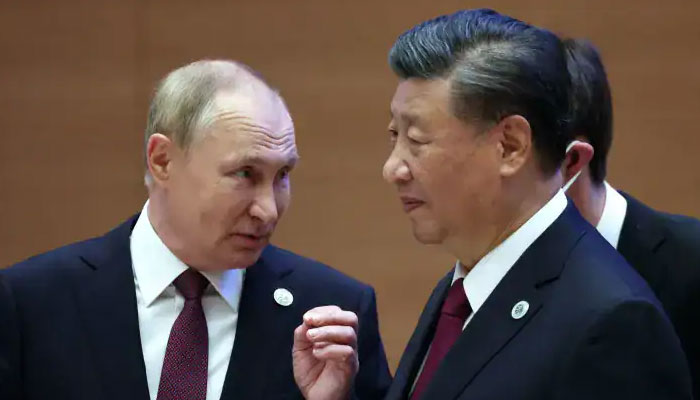The Wagner Mutiny Has Shaken China’s Confidence in Putin and Fueled Domestic Nervousness In Beijing
The recent mutiny within Russia's security apparatus led by Yevgeny Prigozhin's private military company, Wagner Group, has not only sent shockwaves through Moscow but also rattled China's faith in President Vladimir Putin.

The implications of the Wagner mutiny have left China rattled and have also put questions on China’s perception of Putin’s control over his administration and the potential repercussions for China’s own domestic stability.
Historically, both Putin and China’s President Xi Jinping enjoyed strong leadership positions in their respective countries. However, the mutiny within Russia’s security forces has exposed vulnerabilities in Putin’s military power, causing concern and doubt among Chinese leaders regarding the unity of Russian forces and Putin’s ability to maintain control.

While publicly expressing support for Putin, Chinese officials may have been privately left apprehensive about the implications of the mutiny on their bilateral relationship with Russia. The extent of Putin’s power may now be reassessed, potentially impacting the “no limit” relationship between China and Russia.
As a result, in an effort to assuage Chinese concerns, Putin dispatched Deputy Foreign Minister Andrey Rudenko to Beijing to assure Chinese officials of his control over the situation.
China’s Deep Concerns Over Wagner Mutiny
The revelation of Putin’s inability to control Prigozhin and the Wagner Group has disappointed and shaken the Chinese leadership. They are particularly alarmed by the intelligence failure that allowed the mutiny to occur, especially considering reports that the United States had prior knowledge of Wagner’s plans, thus raising doubts about Putin’s ability to deal with complex challenges effectively.
Although not publicly acknowledged, after this episode, China is likely to conduct an internal review of its own military apparatus to identify any signs of rebellion. China is highly sensitive to dissent and fears that incidents like the short-lived Wagner mutiny could undermine faith in strong leadership models, including their own, and lead to undesirable calls for democracy. Chinese social media platforms were flooded with anxious posts as the mutiny drama unfolded.

China’s Reliance On Russia To Offset United States
China relies on Russia, particularly Putin, as a strategic partner in countering the influence of the United States on various fronts.
However, now concerns have grown in Beijing about Putin’s potential departure from power due to illness or a coup and the fact that it is possible that the next Russian president may adopt a less-friendly stance towards China. With a shared 4,200 km-long border, China is wary of potential disruptions in the bilateral relationship.
In anticipation of Putin’s potential downfall, China has been making contingency plans and cultivating closer ties with other Russian leaders. President Xi Jinping held a separate meeting with Russian Prime Minister Mikhail Mishustin during his visit to Moscow, indicating a willingness to establish alternative channels of cooperation. However, the uncertainty resulting from the mutiny complicates China’s strategic calculations.
The Harsh Truth
The consequences of the Wagner mutiny extend beyond China’s relationship with Russia. If the mutiny leads to a gradual withdrawal of Russian troops from Ukraine, China may need to reconsider its options and potentially reassess its trade war with the United States. The absence of a reliable ally like Russia could force China to seek compromises with Washington, which could have wider implications for global trade dynamics.
The Wagner mutiny serves as a wake-up call for China to diversify its international alliances and reduce its overreliance on any single partner. As Beijing assesses the potential fallout from the mutiny, it may seek to strengthen ties with other countries to ensure its own stability and strategic interests. This could involve forging closer relationships with regional powers in Asia, exploring partnerships with European nations, or even exploring new avenues of cooperation with non-traditional allies.
)
Thus the mutiny has thrown open the door to the importance of maintaining a flexible and diversified foreign policy approach to mitigate risks and navigate complex geopolitical dynamics in an ever-changing world; perhaps a lesson from India would do!
The Wagner mutiny has not only shaken Moscow but has also unsettled Beijing. As Russia faces potential political turmoil, China risks finding itself without a close ally on the international stage. The mutiny has undermined China’s confidence in Putin’s control over his administration, prompting a reevaluation of its strategic position and potential contingency plans. The implications of the mutiny extend beyond bilateral relations, impacting China’s trade dynamics and its quest for technological advancement; thus, it may hamper its very growth.
The Last Bit, The Wagner mutiny, has had a substantial impact on China’s perception of Putin’s leadership and the stability of his administration.
Even though China has publicly expressed support for Putin, Chinese leaders are privately concerned about the implications for their bilateral relationship and the potential repercussions for their own domestic stability, which has left China to reevaluate its strategic calculations and contingency plans. Hence, moving forward, China may seek to diversify its alliances and strengthen relationships with other countries to safeguard its interests.






